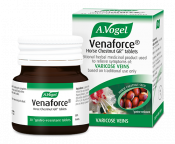An introduction to varicose vein treatment
Varicose veins can be found in many parts of the body. However, as the veins in the calves and thighs are most commonly affected, this page will focus on the treatment of varicose veins found in the legs.
Many people experiencing symptoms of varicose veins will not require treatment. Treatment may be considered if you experience troublesome symptoms, or if you suffer from complications of varicose veins. In addition, some people seek treatment for varicose veins for cosmetic reasons.
Initially, it is worth using a few simple self-help techniques to see if these will help your symptoms. If these do not help, a doctor may then treat you with support stockings or recommend injections or surgery.
A doctor open to the use of herbal remedies may also recommend trying a course of Horse Chestnut seed extract.
Diet and lifestyle advice
Making changes to your diet and lifestyle is the first step you should take when treating varicose veins.
Improving your circulation with regular exercise will encourage your veins to a more healthy state. Gentle exercises such as swimming, a brisk walk or some yoga will help boost circulation without causing your legs to ache later on.
Improving your diet generally will help maintain a healthy weight which is important for reducing the pressure on your veins. It also helps you avoid constipation, which is another condition which worsens varicose veins. In addition, try some of the 10 best superfoods for circulation, to give your circulation an extra boost.
Herbal remedies
Many complementary or alternative treatments have been used for varicose veins. These include vitamin supplements, homeopathy and acupuncture.
However, the most established of these alternative varicose vein treatments is in the use of herbal medicines, especially those containing extracts of horse chestnut seed.
Many will recognise the horse chestnut seed as the conker. These have, at various times, been used as cattle feed, as well as furnishing children with ammunition for conker battles.
Herbalists have a long tradition of using horse chestnut seeds to treat varicose veins. The herb is now prescribed by doctors in countries such as Switzerland and Germany where it is routinely considered as a treatment of choice, filling the gap between the use of compression stockings and more invasive methods such as injections or surgery.
Horse chestnut seeds contain active substances, particularly one known as β-aescin. A large amount of research information is available in the public domain on how horse chestnut seed extracts work.
Although pregnant women are susceptible to varicose veins, horse chestnut should not be taken internally. Instead, use Horse Chestnut seed gel applied externally.
Conventional treatments
If self-help techniques and herbal remedies have not been effective for you, it may be time to turn to conventional means of treating varicose veins. Remember that in many cases you can continue to use herbal remedies along with conventional treatments for the most effective relief.
Your doctor or hospital specialist may treat the varicose veins in a number of ways:
- Support tights - These are also called compression stockings and work by putting pressure on the varicose vein, compressing or squeezing the tissue around the vein to help blood flow up the leg. Although this ‘treatment’ does not address the fundamental problem of damaged valves, it can help to alleviate early symptoms of varicose veins such as tiredness or heaviness of the legs and ankle swelling. In addition, compression stockings may help to prevent complications of varicose veins developing. One downside of support tights is that they can be uncomfortable to use, especially during the warmer summer months
- Sclerotherapy - This involves injecting a chemical agent or foam into the varicose vein, causing it to go into spasm and inflamed with the aim of scaring and sealing the vein. A number of injections into several parts of the vein are usually required at each treatment, which may need to be repeated after a year or so. After the treatment has been carried out, the leg needs to be bandaged for a few days, followed by the use of compression stockings for a few weeks. Treatment does not usually require an overnight stay in hospital
- Surgery - Surgical treatment of varicose veins involves the physical removal of the vein and is carried out under general anaesthetic. A number of techniques are used, depending on severity of the condition and where the veins occur on the leg, but all require incisions (cuts) into the skin. Surgery for varicose veins used to involve a few days stay in hospital, but treatments are now often performed as day cases. After surgery, the leg is bandaged until the wounds heal, followed by the use of compression stockings for a few weeks.
- Radio waves and lasers - These are newer techniques for treating varicose veins and termed ‘Radiofrequency ablation’ and ‘Endovenous laser ablation’ respectively. Ablation means ‘elimination’ - basically, the treatment involves harnessing the energy of radio waves or a laser to heat up the varicose vein, causing inflammation which will scar and seal up the vein
- Trans-illuminated phlebectomy - A phlebectomy is a treatment that removes a vein. This is another new treatment for varicose veins and involves passing a light under the skin to help the surgeon identify the offending vein which is then removed using suction. The advantage of this treatment is that it reduces the number of cuts or incisions in the skin. The procedure is carried out under general or in simpler cases, local anaesthetic.








